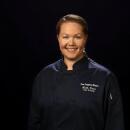Underground restaurants, banana suits and spicy Singaporean chili crab: Nguyen Tran dishes on ‘Adventures in Starry Kitchen’

Nguyen Tran of Starry Kitchen, shows how to make Singaporean chili crab and accompanying beignets.
- Share via
By his latest count, Nguyen Tran figures he probably has 15 costumes. The face behind the restaurant and brand Starry Kitchen just deposited two large bags worth of clothing on the counter at the Los Angeles Times Test Kitchen. Nguyen’s wife, Thi — the other force behind the brand — is busy unpacking and arranging the components for several outfits — including one space helmet — as Nguyen fiddles with a box.
“Anyone have a screwdriver? I need a Phillips head. Oh, and put the crab in the freezer.”
There’s a happy chaos as Nguyen inflates one of the costumes, a tauntaun snow lizard from the movie “The Empire Strikes Back.” Meanwhile, one of his assistants corrals a live Dungeness crab for Nguyen’s recipe demonstration while another follows the Trans’ 17-month-old son, Cillían, around the kitchen.
Nguyen is here to demonstrate the recipe for Singaporean chili crab with buttermilk beer beignets, one of Starry Kitchen’s more famous dishes and among the recipes included in Nguyen’s new book, “Adventures in Starry Kitchen: 88 Asian-Inspired Recipes from America’s Most Famous Underground Restaurant.” Part cookbook, part history and part guide to running an underground restaurant, the book shares Nguyen and Thi’s journey through the food world.
As he stirs a quick beignet batter, Nguyen explains the genesis of Starry Kitchen. “Thi and I love to eat. It’s that simple,” he says. That, and Thi has always been an amazing cook. “Thi’s way more talented than me in the kitchen. I give her full credit.” Nguyen frequently comes up with ideas, and Thi will see it to completion. He credits her with coming up with most of Starry Kitchen’s dishes, including the spicy crab dish.
“I’m the face of Starry Kitchen,” Nguyen says, because Thi hates being on camera. “But she’s way funnier than I am.”
As Nguyen demonstrates the dish and performs for the camera, Thi watches Nguyen’s every move, almost like a manager, making sure the crab recipe is followed correctly. “I love to cook crab,” she says, bouncing Cillían on her knee. “I don’t always love to eat crab. But I love to cook it.”
“Thi’s the flavor, and I’m the experience, of Starry Kitchen.”
— Nguyen Tran, author, “Adventures in Starry Kitchen”
Starry Kitchen takes its name from a popular Cantonese cooking show broadcast on a cable channel out of Hong Kong, and the Trans’ brand can be traced back to 2008, when the couple began hosting underground dinners out of their tiny apartment in North Hollywood.
Before long, the wildly popular dinners earned praise from Yelp and scrutiny from the health department, and the Trans moved to their first brick-and-mortar location. Over several tumultuous years, the Trans would resurrect themselves and their brand as restaurants and pop-ups, weed dinners and delivery service, catering jobs and their latest brick-and-mortar establishment, Button Mash, in Echo Park.
“I’d estimate we’ve reinvented ourselves maybe 10 times,” says Nguyen, breaking down the crab and preparing to dredge and fry the pieces in a hot, oil-filled wok.
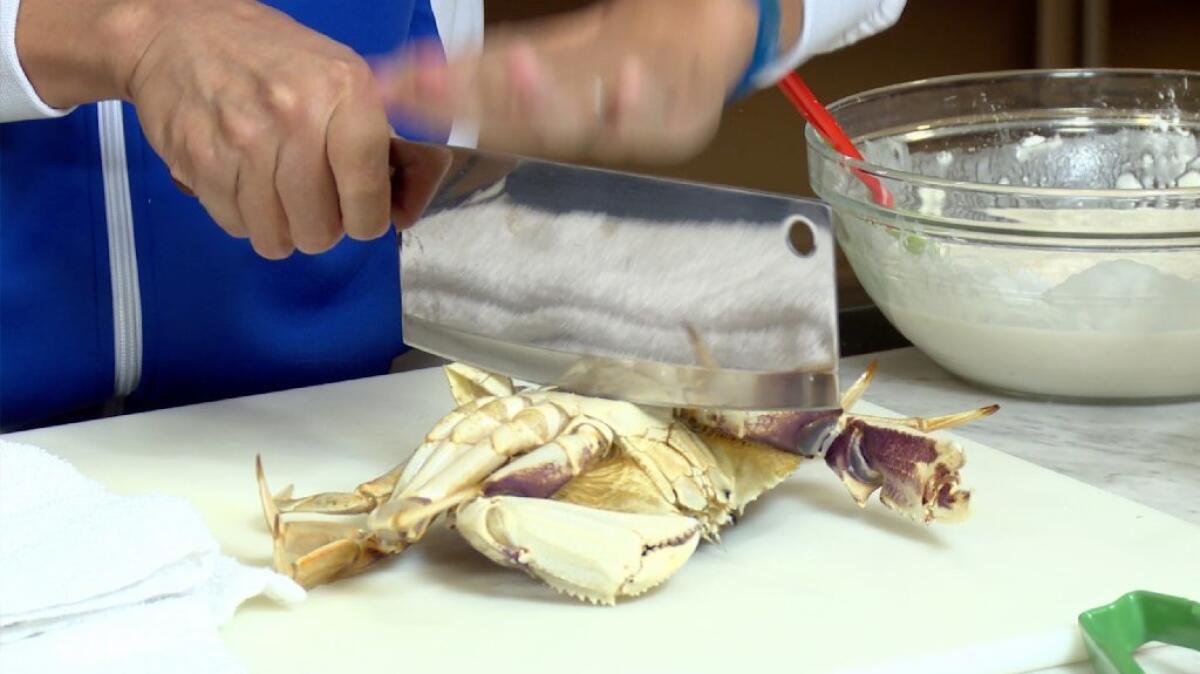
When the last Starry Kitchen location, in Chinatown, closed 2 1/2 years ago, Nguyen considered leaving the business completely.
Nguyen needed time to think. He’d been offered a book deal, and after a month of unemployment decided to start on the cookbook. “One, I wanted to tell people the real story about what happened to us. The other is to inspire people to either start a restaurant — or not,” he says. “No one gets how hard it really is.”
“Adventures in Starry Kitchen” contains 88 recipes, including the restaurant’s famous tofu balls. In addition to smaller recipes that generally serve two to four, the recipes include a “Balls Out” ingredients list offering much larger portion sizes, on average 40 to 80 servings. “I wanted this to also be an illegal underground handbook. I figured if someone wanted to start their own underground restaurant, this would help,” says Nguyen. “I just hope they invite me.”
“Like anything, you draw your food from your upbringing. And we grew up in Texas. We grew up in America.”
— Nguyen Tran, author, “Adventures in Starry Kitchen”
Starry Kitchen’s recipes are a mash-up of cultures and flavors, which Nguyen sometimes refers to as Pan-Asian American food. Both Nguyen and Thi are from Texas, and the dishes largely draw inspiration from a variety of Asian cuisines with an American twist such as the crab, which is served with beignets, or the cookbook’s chicken-fried steak, which they serve with a Japanese curry roux.
“We live in Los Angeles, and we might look at Irvine or Orange County as suburbia — but no,” says Nguyen. “I lived in real surburbia in Dallas. Everything is a chain restaurant or a big box store.
“I was so limited as a kid. I didn’t want to be chastised for not being white. It held me back.”
Nguyen’s parents are originally from Vietnam, and it wasn’t until he visited that country that he began to embrace his Vietnamese background. And as he started celebrating his Vietnamese heritage, he also began to cherish his Texas roots.
Recipe: Buttermilk beer beignets »
After frying the crab, he stirs Starry Kitchen’s chili crab sauce, the mixture flavored with ketchup, one of the ingredients Nguyen calls a secret weapon in Asian cuisine. The recipe specifically calls for Hunt’s ketchup, which Nguyen feels is symbolic in his personal evolution.
“Hunt’s ketchup is a great example of that,” he says while whisking. “We use Hunt’s because that’s how we developed it. I know that’s blasphemy because everybody uses Heinz.” Hunt’s, Nguyen argues, has a sweeter, stronger flavor. He’s also a fan of Del Monte ketchup. “It tastes really good, and who cares?”
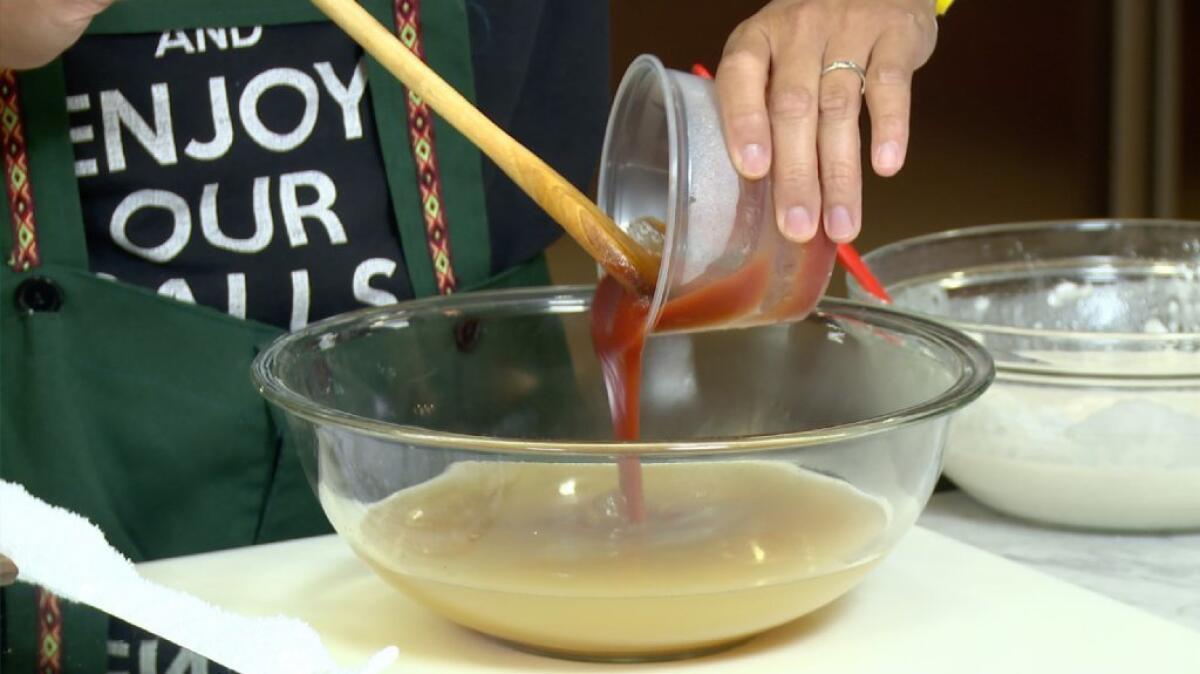
The crab dish is Starry Kitchen’s take on a famous Singaporean dish, and it took the Trans two years to develop it before they began serving it at their restaurant. In the cookbook, Nguyen claims that his is only one of seven restaurants in North America to offer the dish.
Originally, the Trans served the crab with fried steamed buns, similar to those that might be served with pork belly or Peking duck. Then they thought of buttermilk beer beignets.
“Being from the South, we used to go to New Orleans a lot,” says Nguyen, gently dipping mounds of beignet batter into hot oil using an ice cream scoop. “Thi came up with the idea for savory beignets.”
“Who doesn’t love beer?” says Nguyen, flipping the beignets, shaped like hush puppies, until they’re golden on all sides.
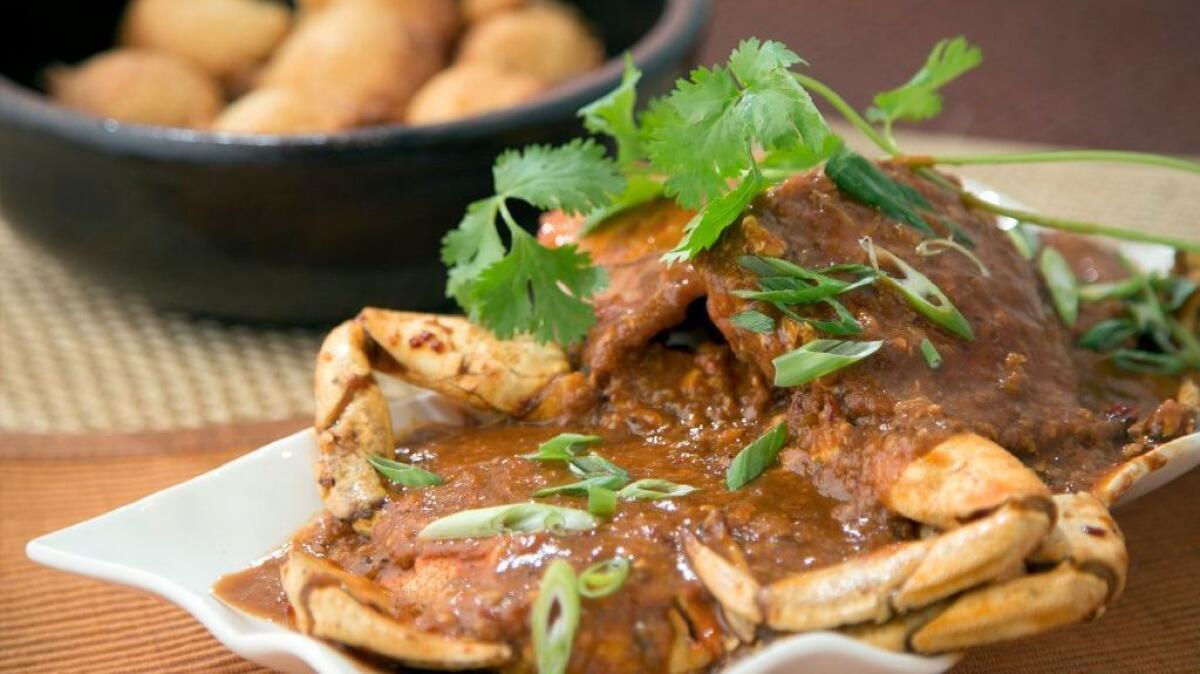
Recipe: Singaporean chili crab »
As he plates the dish, Nguyen thinks about the future. Much as they’ve loved their unique food journey, they don’t see themselves running restaurants day to day, particularly now that they’re new parents. Nguyen is looking into mass-producing Starry Kitchen’s tofu balls, and he’s thinking about opening up other Starry Kitchens, but as something more akin to a franchise concept. He’d also love to continue with delivery service, calling it his “brick-and-mortarless” concept.
Before he takes the finished crab dish into the photo studio for a final shoot, Nguyen slips into his banana costume. Outside the Test Kitchen display window, a small group of people have gathered. They’re taking pictures, pointing and smiling at the sight.
“I wear the banana suit for fun. And because I can.”
— Nguyen Tran, author, “Adventures in Starry Kitchen”
“The thing about the banana suit is the response you get from it. It makes people happy,” he says. Starry Kitchen has a reputation for being fun and crazy, Nguyen acknowledges — in his banana suit — noting that how much thought goes into the food, and how serious he and Thi are about each dish and technique, can get lost.
“But then, people shouldn’t always be too thoughtful about food. Sometimes eating is just about having fun.”
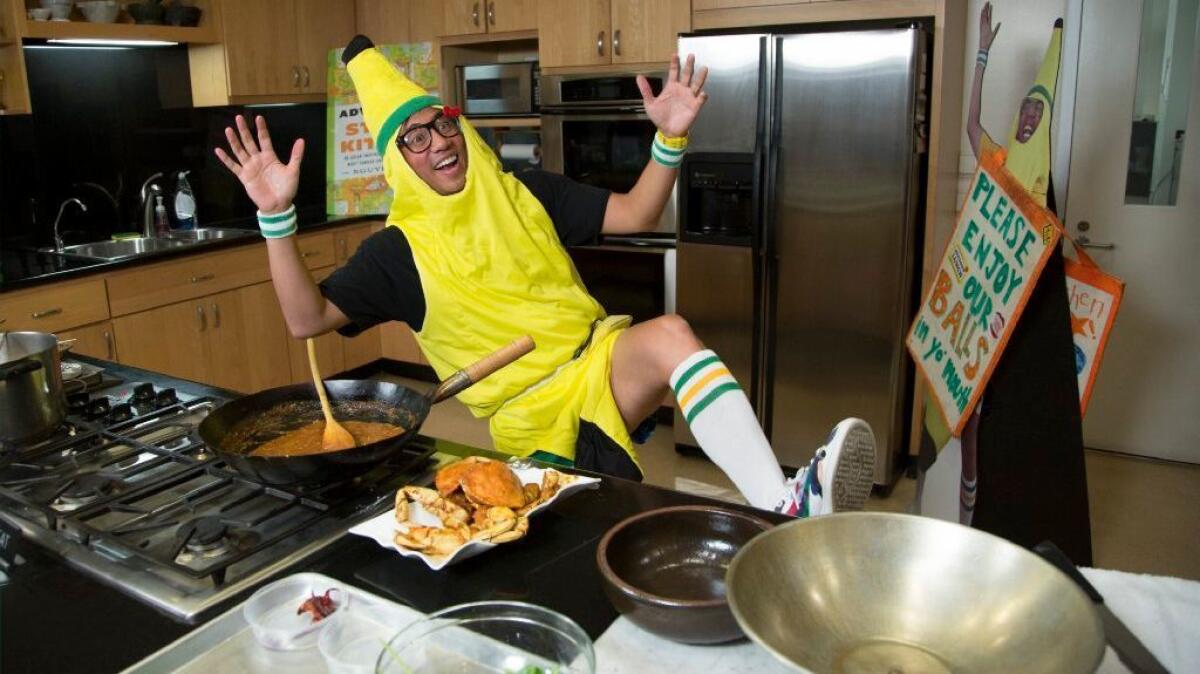
ALSO
Recipes ready in 30 minutes or less
Fried chicken: Nine great recipes for crunchy goodness
Browse our Recipe Database for thousands of our best recipes
More to Read
Eat your way across L.A.
Get our weekly Tasting Notes newsletter for reviews, news and more.
You may occasionally receive promotional content from the Los Angeles Times.



